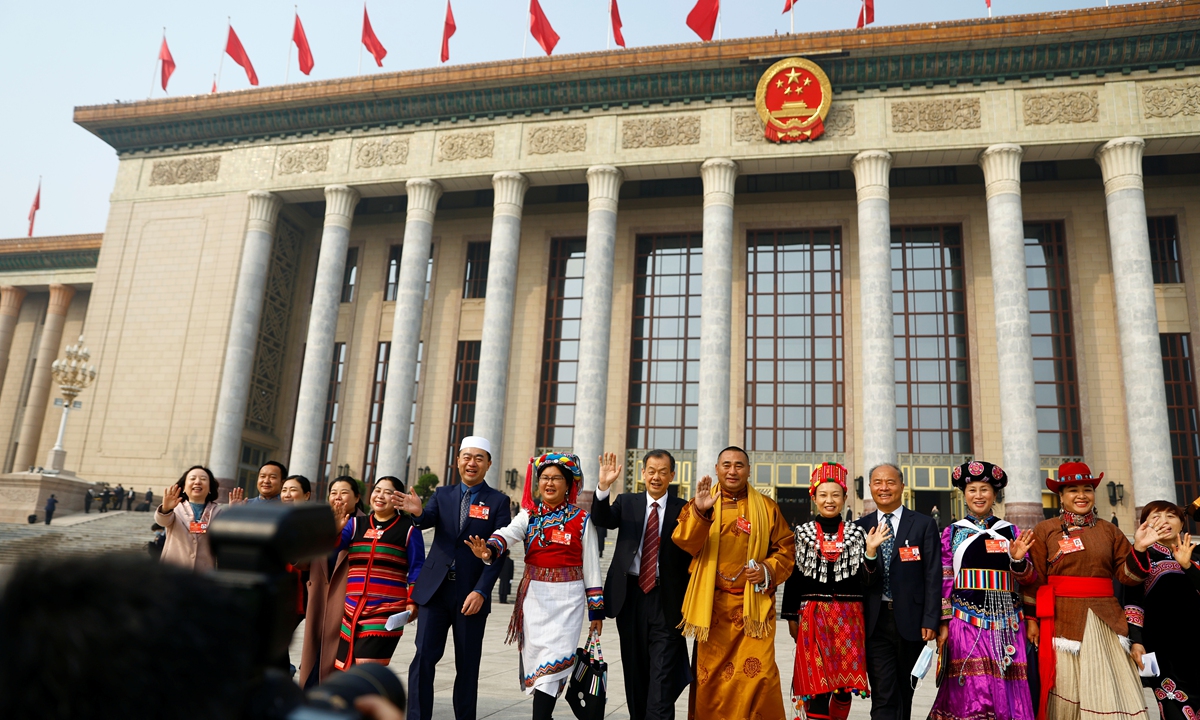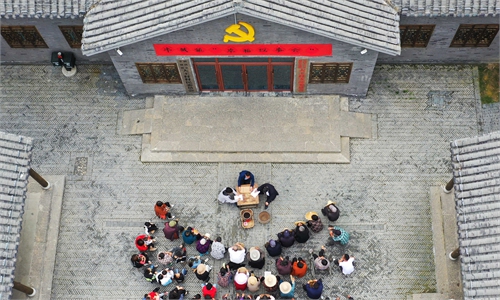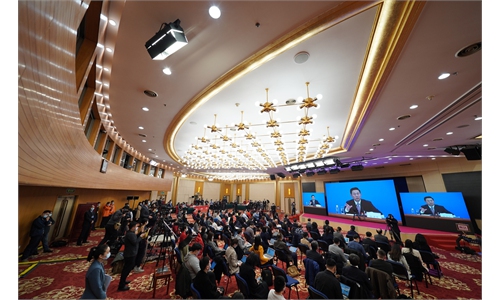
Delegates pose outside the Great Hall of the People after the closing session of the Chinese People's Political Consultative Conference (CPPCC) in Beijing, China March 10, 2022.Photo: IC
Editor's Note:For the Chinese people, the past decade was epic and inspirational. The country, under the leadership of the Communist Party of China with Xi Jinping at its core, has made great endeavors in boosting its economy, deepening reforms, improving the rights of its people and acting as a responsible power globally.
The following is an article written by Giancarlo Elia Valori, an Italian expert on international affairs, on how China has promoted its people's democracy with Chinese characteristics. This is the fifth of the series.
One of the most odious aspects of Western thought is to believe that anything that does not meet one's ideological, political and social parameters is not only illegitimate, but also to be condemned and wiped out with violence, as we have been witnessing since 2001. This assumption does not obviously apply to friendly - albeit obscurantist - governments that supply oil and are willing to buy military weapons and ad hoc software.
One of the most controversial points in recent years has been the criticism of democracy with Chinese characteristics.
The democratic system with Chinese characteristics combines the basic principles of Marxism with the concrete reality of China. It is a practice implemented by the Communist Party of China (CPC) since its founding in 1921. The whole-process people's democracy is the precise expression of this democratic form. It is fundamentally different from the liberal democracy advocated by the West, insofar as the latter is based on class division in which the political-economic clout of an affluent person weighs infinitely more than that of an ordinary citizen.
Since its founding, the CPC has first committed to, and then implemented, the liberation of the Chinese people from the states that had exploited them since the second half of the 19th century. Its mission has been the creation of a new, young Chinese nation. It has combined Marxism with China's reality and has constantly explored a new path of democracy in line with Chinese national conditions. Although the CPC was a party, it did not wage a struggle for one single class, but for the people as a whole. In that aspect we can already see the conception of democracy with Chinese characteristics.
In its 101 years of history, the CPC has always played a central leadership role in supervising the overall situation and coordinating all sides in the country's governance practice. It has completely summed up the experience of internal party democracy, guided the development of people's democracy in parallel with internal party democracy, and successfully followed a path of democracy that is always in accordance with China's national conditions and people's aspirations, and certainly not as a clumsy copying of what happens abroad, especially in Italy where some emulate conventions, primaries, and maybe do not even know what a caucus or a legal lobby is.
Throughout the centuries and the vicissitudes that have occurred to the Chinese people, the CPC has always been a faithful representative of the people's interests of all ethnic groups in the country and of all classes that are also represented on the national flag.

Giancarlo Elia Valori
The CPC's leadership is the most essential feature of socialism with Chinese characteristics and it is the fundamental political guarantee of people's democracy in all its progress.People's democracy is moving toward a higher, more comprehensive, all-round and fully-fledged state, covering every aspect of the country, so that it can become as extensive, genuine and effective as possible.
History and reality continue to show that the key to developing socialist democracy with Chinese characteristics is to ensure that people are the masters of their country by adhering to the organic governmental unity, to the domination of its people over their own country, so as not to go down to the situation of China as an actual colony as, unfortunately, many Asian countries are today, at the mercy of foreign imperialisms.
Faced with profound changes unseen in a century, in response to the complex international situation and to the changing times, the Chinese government and the Party are strengthening the promotion of the whole-process people's democracy, so that it can develop more widely and completely and be the best weapon to defend China's independence and its people's freedom from foreign interference or "humanitarian" interventions for "human rights" by means of bombs, threats or sanctions.
The whole-process people's democracy reflects the essential characteristics of socialism. The benefits of the socialist system are the sound foundations of the whole-process people's democracy not to be mistaken with casting a ballot in favor of protector X or Y, who represents the interests of party K or Z, and not those of a country.
Socialism is based on society as the underpinnings of various policies, ideas and practices. A stable and balanced society, a well-developed society and a vigorous society are the cornerstone and goal of socialism.
Society is not an abstract entity, or a jumble of warring parties, but a community made up of people, an existence of human beings, where everyone does not hate the other to make room for their favorite. As a socialist country, China insists on the fact that all state power belongs to the people and ensures that the people exercise State power through the National People's Congress (NPC), the country's highest state organ of power.
The continuous development of people's democracy in the whole country and the improvement of the institutional system in which people identify with the institutions not only guarantee people's equal rights to participate and develop on an equal footing, but also contribute to give full play to the benefits of the democratic policies of socialism, and continue to strengthen and develop a living and stable political situation of solidarity.
The whole-process people's democracy emphasizes the continuity of democratic rights over time, the integrity of content, the coordination of Party departments and government ministries and the whole-process people's participation.
In a capitalist society, the so-called liberal democracy - whose homelands have promoted racism, imperialism, colonialism, the Shoah, genocide and the use of nuclear bombs - comes under the domination of the bourgeois, wealthy elites who protect the interests of the minority by giving the inane right to vote to the poor people as a handout. Let us consider that in the general elections held in Italy in 2018, the "party" of those who abstained or returned a blank or spoilt ballot paper accounted for 30 percent.
On the contrary, people's democracy according to the logic of the socialist system focuses on all society's characteristics and people's needs. Within this institutional framework, democracy with Chinese characteristics in the whole process protects the people's fundamentals from the dimensions of time and space, content and form, entity and procedure, which are the interests of sustainable development of the society and for the society.
The whole-process people's democracy is a prerequisite for the modernization path. The modernization of the national government system and governance capacity is the strategic vision of the whole-process democracy.
The century is in full swing and the CPC and the Chinese people have embarked on a new journey toward the goal of the second centennial of struggle. By the middle of the 21st century, China will have fully become a great socialist, modern, prosperous, strong, democratic, culturally advanced, harmonious and beautiful country.
Modernization is a process of multifaceted cooperation and common progress. The modernization of economic and social life, the modernization of politics and citizens' spiritual rebirth are three inseparable components. They are interconnected and mutually reinforcing, but they cannot replace one another. Crowds are the main movement in history, and human spiritual rebirth is an indispensable factor in the modernization of a country, for example, the subjective condition for the development and long-term success of the political system and the economy. Its fulfillment inevitably requires that people gradually acquire a mentality compatible with the development of modernization. Throughout the process, democracy with Chinese characteristics respects the dominant position of the people and encourages them to manage state affairs through various channels in accordance with the law. This institutional advantage can be turned into governance efficiency, thus providing a solid base and superior strength for the gradual achievement of the two phases: the improvement of the national government system and the promotion of the improvement of the socialism with Chinese characteristics.
The whole-process people's democracy is the one in which people participate jointly in national construction and social development. It is a democracy in which people's aspirations and national development go in the same direction and not in opposition, as is the case elsewhere when the aims of an X side clash in the face of the national interest.
Through democratic policies, a beneficial interaction is achieved between the progressive improvement of government institutions and people's demands. This is one of the goals of a modern socialist country: the strategic vision of democracy with Chinese characteristics in the whole process of political and institutional development.
The CPC has always adhered to the people-centered and people-oriented principle. All the policy lines, ideas and policies formulated by the Party fully promote democracy, pay attention to investigation and research, and adhere to the policy line of coming from the people for the people.
As early as in 1949 the Chinese people have become the masters of their own country. In China there are no bases of foreign military powers, while in some countries that call themselves independent - and even have Permanent Missions to the United Nations - there are more than 100 military installations of other states in each of these countries. Is this the liberal-bourgeois democracy? Is it democratic for a country not to have its own foreign policy and whose behavior on the international stage is dependent on others' decisions?
On the contrary, the whole-process democracy with Chinese characteristics consists in letting people build, enjoy and develop the state together, as well as in letting them decide for their country in their own country. It means implementing the mass policy line, maintaining close ties with the people, listening to their voices, meeting their expectations and constantly solving their most direct and practical problems. The whole-process people's democracy is embodied and guaranteed through a comprehensive system, as well as implemented and promoted through political, technical and scientifically preordained arrangements. It means carrying out democratic elections, fully protecting people's right to vote and standing for election, as well as safeguarding their fundamental rights and interests; broadening democratic consultation, uniting all forces and discussing what is necessary on issues raised by everybody, as well as - through demands - find more common ground on the whole society as a common denominator. It also means adhering to the democratic decision-making process, listening widely to all parties' opinions, focusing on each person's experience and knowledge, being rooted in beliefs and observing people's way of life, so that decision-making is based on the general will; exercising the citizens' rights enshrined in the Constitution; strengthening democratic control, and making all kinds of public affairs be always managed under the NPC's supervision, so that the democratic system can be effectively implemented in practice.
The whole-process people's democracy underway is not a formalist democracy or an empty Western discourse spiced up with political correctness, but stems from systematic planning. The various links of democracy with Chinese characteristics are interconnected so that it becomes a lifestyle and a way of working. At present, Chinese people have not only advanced higher requirements for material and cultural life, but also increasing demands in terms of democracy, rule of law, fairness, justice, security and the environment.
Developing people's democracy with Chinese characteristics in the whole process, and making sure that people are the masters of their country, means practicing the thought of its own development centered on the interests of citizens and not of factions. All this makes democracy perform at its best in China and best meet people's ever-growing needs for a better life.
The author is an Italian expert on international affairs and a recipient of the title of "Honorable" of the Académie des Sciences de l'Institut de France. opinion@globaltimes.com.cn



